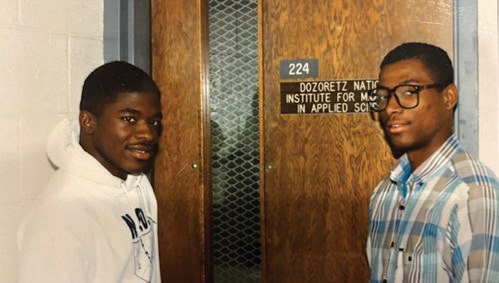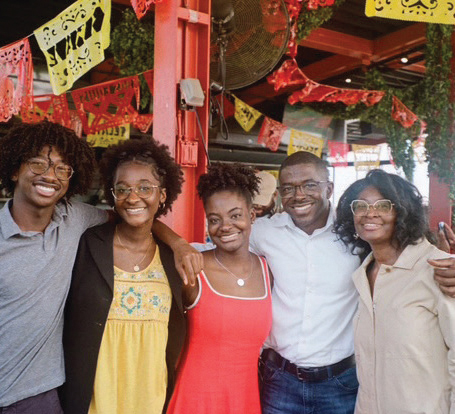DNIMAS Scholar Takes Helm Of Georgia HBCU
As a graduating high school senior, Robert Scott was grateful for the opportunity to attend Norfolk State University that coming fall. He would become the first in his family to attend college. At that time, he never imagined that it would lead him on a journey that would place him at the helm of a higher educational institution.
Last March, after a seven-month national search, Dr. Scott emerged as the single finalist to lead Albany State University as its 11th President and began his tenure May 1. He intends to use the lessons he learned as a student and professor at Norfolk State and his experiences in the corporate world to lead the Georgia Historically Black College and University.
 According to its website, Albany State University is one of three public HBCUs in Georgia and has a $266 million economic impact on the area. The University has an enrollment of 6,800 students and offers more than 35 undergraduate degree programs and multiple graduate programs.
According to its website, Albany State University is one of three public HBCUs in Georgia and has a $266 million economic impact on the area. The University has an enrollment of 6,800 students and offers more than 35 undergraduate degree programs and multiple graduate programs.
“Once I got into college and began to understand what a university was and the work of a University President, I knew I wanted to impact the lives of young people the way that Norfolk State had impacted my life and the life of my family,” said Dr. Scott. “Norfolk State made me better than they found me.”
 He entered the Dozoretz National Institute for Mathematics and Applied Sciences (DNIMAS) program, majoring in biology. Started by NSU President Harrison B. Wilson Jr., the scholars program seeks to address the shortage of minorities in science and technology and enrolls students who have the ability to earn terminal degrees. President Scott became the first DNIMAS graduate to achieve that goal, earning a Ph.D. from the Georgia Institute of Technology.
He entered the Dozoretz National Institute for Mathematics and Applied Sciences (DNIMAS) program, majoring in biology. Started by NSU President Harrison B. Wilson Jr., the scholars program seeks to address the shortage of minorities in science and technology and enrolls students who have the ability to earn terminal degrees. President Scott became the first DNIMAS graduate to achieve that goal, earning a Ph.D. from the Georgia Institute of Technology.
Learning, Earning and Giving Back
 The DNIMAS program and Dr. Wilson left a lasting imprint on Dr. Scott. He was part of one of the first classes to graduate from the program, which had its first freshman class in 1986. He has praise for all of his professors and the staff of the program. “The DNIMAS program stands out, and every faculty member associated with it. They raised me and taught me how to be successful.”
The DNIMAS program and Dr. Wilson left a lasting imprint on Dr. Scott. He was part of one of the first classes to graduate from the program, which had its first freshman class in 1986. He has praise for all of his professors and the staff of the program. “The DNIMAS program stands out, and every faculty member associated with it. They raised me and taught me how to be successful.”
Dr. Scott came to understand the full power and value of what he learned at Norfolk State when he arrived at Georgia Tech—a university much bigger than Norfolk State, with high-caliber students from across the country. He wondered how he’d measure up. He got his answer while taking a course that included graduate students and senior research candidates. “I remember being in my graduate-level biochemistry course and taking my first set of exams,” Dr. Scott recounted. “And when they handed out the scores for the first set of exams, I was among the top scorers in the class. That moment alone changed how I viewed my work and readiness for the next level. After that, I took off like a rocket ship.”
He's always had the goal and the passion to give back. Dr. Scott understands that he owes Norfolk State more than a debt of gratitude. And so it was important to him to be a role model—living proof that students like him—being the first in their families to attend college—see that they can be successful and what they can achieve. After earning his Ph.D., he chose to come back to teach at Norfolk State. “Dr. Wilson, the president at the time, and I spoke, and he gave me my first job. It was a full circle—he created the opportunity for me to go to school and then gave me my first job.”
Dr. Scott’s resume is a mixture of academic and corporate experiences.
 After teaching at Norfolk State, he went on to serve as an associate dean at Boston College and Spelman College. He later left academia and entered corporate life, working for some of the biggest companies in the world. Those experiences, he believes, have also helped prepare him to be president of ASU.
After teaching at Norfolk State, he went on to serve as an associate dean at Boston College and Spelman College. He later left academia and entered corporate life, working for some of the biggest companies in the world. Those experiences, he believes, have also helped prepare him to be president of ASU.
“I started my corporate life at Procter & Gamble. I spent most of my growing up and learning how to be in the corporate world at Coca-Cola,” President Scott explained. While at Coca-Cola, Dr. Scott led teams in the United States, Europe and Asia. He later headed up Coke’s Latin America research and development efforts as Vice President of Research and Development. He was Divisional Vice President of Global Product Development at Abbott Nutrition before serving as President of Research and Development at Kraft Heinz North America.
“On the surface, I may look a little atypical. But today’s university presidents are coming from outside academia,” said Dr. Scott. “The leadership for higher education and the leadership for corporate is not different. It’s very similar.” “Corporate life has taught me how to make hard, fair and good decisions. It’s taught me how to prioritize resources. It’s taught me how to have conversations at all different levels, from federal government to local government. It has made me ready for the presidency.”
Because Norfolk State provided him with a life that he could not have imagined as that high school senior, Dr. Scott is ready to give back. He has a hunger and an ambition to provide students at Albany State with the kind of opportunities that made such an impact on his life.
“I’m in this job 100%. Schools like Albany State and Norfolk State are huge changers in social mobility,” he said. “ Albany State is my opportunity to give back.”